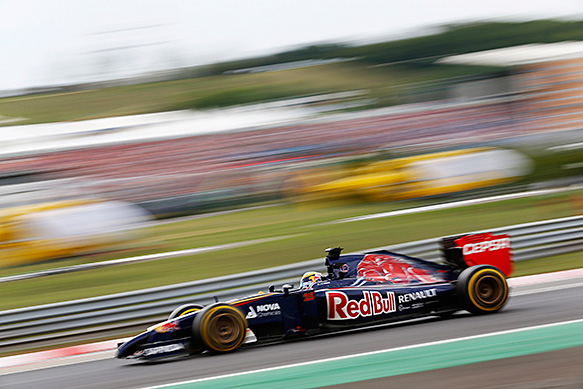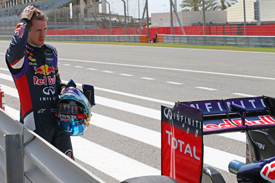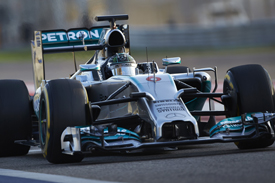The early talk of Formula One racing's new era was
that Mercedes were in good shape, but even after a convincing
pre-season, few were expecting them to be quite so dominant in 2014,
taking nine wins from the first 11 races.
In a wide-ranging
interview, Mercedes-Benz head of motorsport Toto Wolff discusses the
Silver Arrows' rise, and explains how the team intend to keep a lid on
the simmering rivalry between title rivals and team mates Nico Rosberg
and Lewis Hamilton...
Q: Toto, it's obviously been a
phenomenal season for Mercedes so far, but when did you know, or start
to realise, that you were in good shape?
Toto Wolff: Late, you
know - late into testing. We were flat out, and we didn't have any
indication of where we were compared to our competition. We were very
proud to be the first ones out of the garage, and to have had a couple
of okay days compared to our competition, who sometimes struggled even
to get their car out. So it was clear that we had an advantage: if you
can test versus someone who is unable to, there is a big advantage you
take from it. But we didn't really know about performance, about power,
about fuel consumption, until we actually started racing. We were
confident, and carefully optimistic that we had done a good job in
integrating the power unit into the car, but you cannot get carried away
- ever.
We had a discussion in the second or third test, where
we knew we were looking competitive, about whether it would be similar
to 2009 and Brawn. But we estimated it would be less, because when Brawn
started the 2009 campaign they had a big advantage. We didn't think we
were on that level.
Q: And after Australia?
TW: It was
still not clear, because we expected the others to make big steps
forward. They were lacking the testing [mileage], but they improved a
lot between the last test and Australia, so we expected them to make big
steps forward. This is why we were always careful in our assessment of
where we were.
Q: After Australia, another eight victories
have followed. Mercedes now hold a commanding advantage in the
constructors' standings. When can you be confident about that title
heading in your direction?
TW: For me, we are not in the betting
or gambling business. When it is mathematically impossible to be caught,
that is when belief becomes reality. It is just not how we function
that we speak about titles before they are actually achieved.
Q:
You were in the hunt heading into last year's summer break, having won
in Hungary and Great Britain, but Red Bull dominated the second half of
the season. Do you understand why - and does that prove just how quickly
things can slip?
TW: Yes, it shows how quickly it can fall away,
but I didn't ever see us as contenders last year - we had good
qualifying performances, but we were never able to translate that
properly to the races. We had great races in Monaco, in Silverstone, and
then we had the ‘Lewis factor' in Hungary when he [Hamilton] was on a
completely different level to everyone else that day. But we understood
well where we needed to improve, and none of us expected to be a
contender to Red Bull. Also there was a clear strategy of transitioning
development to 2014; we discussed it a lot and decided that was the
right way to go. It was an early switch, earlier than normal, because we
knew the reason we are here is to fight for the world championship, and
it was clear that we couldn't catch Red Bull in 2013.
Q: Talking of the ‘Lewis factor', how have you rated him and Rosberg over the opening 11 races?
TW: The
two of them are both very important pillars of the performance of the
car and the success of the team. They push each other to new levels, to
new heights, in a way that is not detrimental to the team. It can get
quite messy, and we have seen that at other teams. To this point it has
been very beneficial for the team. We are in good spirits here, we have a
good atmosphere, and having two drivers on that level, racing each
other like they do, is not only good for the brand but also for
performance overall. It is a very important ingredient for the success
of the team.
Q: But how do you stop their rivalry from boiling over? How do you prevent a repeat of Senna versus Prost?
TW: For
the drivers, it is about the drivers' world championship, but
nevertheless you have to understand that there is a big organisation
behind them - one of the biggest and most well-known brands in the world
- and sometimes the team comes first. That is clear and both of them
acknowledge and accept that. This is very important. They recognise the
historic achievements of Mercedes-Benz in motorsport, and they put their
own place in the right context.
Q: There have been a fair few flashpoints though...
TW: Yes
of course. What we do is manage the team every day. We have discussions
with the drivers, with the engineers, every day. As a manager it is
important to be transparent and straightforward. This is a crucial
attitude in running a company towards your people, and something we
nurture.
Q: Presumably the situation, and their rivalry, will only get more heated and tense as the season develops?
TW: Yes,
potentially it is going to get more heated, but if we carry on in
performing as we do now I am still carefully optimistic that it is only
up to the two of them in fighting for the world championship. Then we
get to a situation where we could discuss if we want to maintain the way
we work with each other. Do we think it is beneficial for the car, the
team, and both sides of the garage? Or do we want to recalibrate a
little bit, because it is about the two of them and one remaining world
championship?' That is a question mark - I don't know, because I haven't
been there yet. It is new ground.
Q: Do you get nervous about
it? Situations like Bahrain and allowing them to race constitute quite a
risk on the team's behalf - but were also very beneficial for the team
and the sport as a whole...
TW: Yes, I think it was very
beneficial for Formula One and for Mercedes. We all loved the race, even
if I got a couple of grey hairs during it. There is much more than our
own little sporting agenda. There is F1 as a sport; the fans; the brands
we represent. I think we owe it to everyone to let them race,
especially in a season when it is our two cars battling out front. I
could be very short-sighted and say I want to win the drivers' and
constructors' titles, and this is how we do it: team orders, don't crash
into each other, and carry it on like it was always done. But we are
going into new ground. Until now it has functioned really well. Could it
come to a point where we say it is difficult to manage? It could be,
but I don't see it - not with the two of them.
Q: Do recent races like Austria prove that your rivals are catching up?
TW: Teams
will be catching up. As I said before I think we had a very good start
to the season, and did more kilometres than others, but eventually they
will make that up. We were not good enough in Austria, and Williams were
very good, and you see how quickly it goes. You have a strong
competitor suddenly. But Austria was also a new track and you had teams
not being competitive where you expected them to be. I remember the
discussions we had before the race, talking about how the high-speed,
high-downforce corners should suit Red Bull, but actually it didn't at
all. So maybe there are a couple of learning points about how the track
really needs to be tackled.
Q: And if your rivals catch you, does that change how free Rosberg and Hamilton are to fight against each other?
TW: Yes,
we have already started to change our approach when we saw how near
Williams are. We don't need to push our cars to the absolute limit if we
see our two cars have an advantage; they can still race each other on a
level that still has a tiny bit of a security margin in terms of
temperatures, pressures. You don't need to hit the car hard if you are
only racing your team mate. So that is an approach we have changed and
recalibrated after Spielberg. But in a situation like Spielberg where
Williams are close you need to go flat out.
Q: It has obviously been a good season for you so far, but has F1 racing 2014 style been a success in your eyes?
TW: I
watched the final race of the 1984 championship in Portugal recently,
and I came into it one third of the way through. These races were much
more boring: you couldn't hear the engines on TV because they were also
turbos, and the only overtaking was lapping. So I wonder. I think we
have a great product, some great races. Will we always have great races?
No. But is every football match great? No. You had Bahrain, Montreal,
Austria... I think we have a good product. In trying to make it more
exciting, have we gone into territory we shouldn't have? Maybe - maybe
double points are not right. But let us do double points and then judge
at the end whether we have done something wrong or not. Is it pure and
simple, as F1 should be? No it is not, and I am against it. But maybe
once we have gone through it we will like it.
There are a couple
of people who always say how good it was in the old times and how we
need to go back in the regulations. But you cannot be blind to what is
happening in the world. I think F1 is the pinnacle of motor racing; it
is the best drivers and the best cars. Contrary to what is being said I
think the fans do care that these are the best and quickest cars. For us
at Mercedes the reason we are here is that there is a clear link and
exchange between F1 and the road cars, in both directions. That is not a
marketing gag but reality, it happens. Honda has proved the concept is
interesting and who knows what discussions are ongoing at the various
companies about joining. Looking at what Mercedes have done, maybe we
could be seeing some of the others joining.



